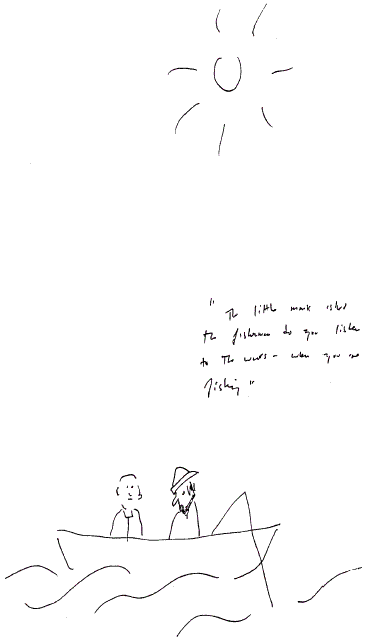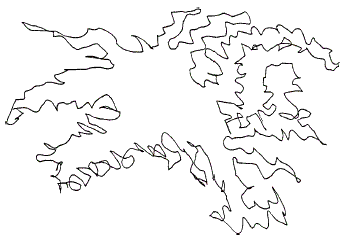|
The
little monk was delighted and said good-bye to his dolphin friend.
The dolphin waved and squealed a sad good-bye. Saying good-byes
are always difficult, dear readers, especially if you are saying
good-bye to a close friend. The little monk remembered the good
advice of the dolphin and stepped aboard the rickety little
boat. Once aboard, the little monk asked the fisherman: "Dear
Fisherman, Sir, why have you not caught any fish in this spot
and why do you stay here so long if it is not fruitful?"
The fisherman cast a strange glance at the little monk. "Don't
you understand? I fish here because there is always the chance
that my luck might change. Every day I steer my little boat
to this spot and anchor it firmly. This is my sole goal in life.
It gives me a reason for living." The fisherman
ended his discourse with a slight sneeze.
The little monk was annoyed by this answer, but was beginning
to get used to such strange discourses. The more he expected
less, the easier it soon became to discover new and exciting
things. Indeed, this new and strange process of letting things
fall away was something to look forward to. It wasa gift of
sorts.
As the fisherman turned the boat around and started to steer
home, the little monk listened to the song of the waves. He
tried to blend with them as they gently hugged the fisherman's
boat. Many times, while sleeping in the monastery, something
would disturb the little monk. Something invisible and untouchable.
Dear readers, we all seem to be disturbed in our sleep from
time to time. Somehow an ocean of unknown waves pulsates within
us all. These waves whisper to us about the future, yet we often
fail to listen to them. Humans are sometimes terribly timid!
The little monk asked the fisherman: "Do you listen to
the waves when you are fishing?"
"Yes, I do," said the fisherman. "They are my
friends, every time I leave shore and come over here they welcome
me back. We've known each other for so long. We have these long
conversations."
"What do they say?" asked the little monk.
"They tell me to be free," answered the fisherman.
"Are we near shore now?" asked the little monk.
"Yes, I think so," said the fisherman.
"How far is it?" asked the little monk.
"Not too far," answered the fisherman, as he pulled
on the fishing net.

The
little monk could now see the shore. There was sand on it. This
was quite normal, but beyond the beach seemed to lie even more
sand. "Could this be a desert?" asked the little monk
to himself. Indeed, it was starting to look like one. Who could
possibly live in such an unfortunate place? The little monk
became suddenly destitute. Would he ever discover the meaning
of
life in such a forsaken place? Where did the fisherman live?
Al these questions buzzed inside his head.
The boat finally reached shore. It seemed to have taken quite
a bit of time. But, at last the little monk was able to step
on solid ground again. He had not done so for quite a long time.
He looked at the fisherman, who was now walking straight ahead
into the desert sands. With little warning, he seemed to fade
away. Now, the little monk had no intention of being left alone
in this lonely and desolate place, so he quickly began to run
after his new companion. As I told you before, dear readers,
good friends are most hard to find. Perhaps this fisherman was
one of them!
The little monk followed him from a distance. The fisherman
was walking at a very brisk pace and it was not easy going.
Especially since the flat land was now giving way to huge sand
dunes made of sand so fine that each step made one sink deeper
and deeper into them. The fine particles had a way of getting
into the eyes, which made the journey most unpleasant to the
little monk. Indeed, everything in this environment seemed to
get fuzzier and fuzzier, the closer one inspected things. Nothing
seemed solid at all.
"Could the mindheart be also like this?" thought the
little monk to himself. "How can one possibly control anything
in this environment? The little monk's heart began to feel like
a tight knot when he thought things like this. Indeed, readers,
we always seem to be tying knots of many kinds when we want
to control things that cannot be controlled. We seem to control
our
Universe with silly knots. This is a peculiar habit of humans
and even of monks, so entrenched are we in our ways ....
The
sun was beginning to set. The fisherman reached a small little
lake and sat down beside a rock. He motioned to the little monk.
"Would you like something to eat?" he asked.
"Yes, please," answered the little monk.
Out of nowhere the fisherman took out a huge apple from his
pocket and gave it to the little monk. The little monk was quite
startled. Not only did he have a new friend, he had also found
a magician.
"How did you do that?" asked the little monk.
"Oh, it's not so hard," retorted the fisherman. "In
matters of the heart, everything is magic. For the heart lives
on this spirit island, where the laws of space and time do not
operate. Matter and energy can take on any form. Have you ever
seen the law of gravity actually operate in a dream?" asked
the fisherman to the little monk.
"I don't remember my dreams very well," muttered the
little monk, almost ashamed to admit such a dark secret to his
newly found friend.
"You should learn how to talk to the heart," said
the fisherman. "It needs to be constantly reassured that
all is all right. It is sometimes afraid. When you are on the
edge of a fear, this is when the gap between the heart and your
mind becomes the most noticeable. People are so funny. They
always want to measure things. Is something higher or lower?
Is that thing better or worse? These are not affairs of the
heart. Do you understand?" asked the fisherman, looking
quite serenely into the distance.
The little monk was not quite sure how to answer this question.
Life to him seemed too complicated at times. There were so many
things he didn't understand.
"Where do we go when we die?" asked the little monk
to his new found friend.
"We return to the spirit island," answered the fisherman.
"Where else can we possibly go?" This all seemed so
basic to the fisherman, but the little monk was not completely
satisfied with this answer.
"Does the heart live in this spirit island?" asked
the little monk.
"But of course!" shouted the fisherman. He was now
beginning to get a little annoyed. He continued: "We go
back to the heart. It does not understand space or time. Look
at this wall."
"But
of course!" shouted the fisherman. He was now beginning
to get a little annoyed. He continued: "We go back to the
heart. It does not understand space or time. Look at this wall."
"What wall?" asked the little monk.
"This one," said the fisherman, and out of his pocket
he picked a pebble which he threw into the lake. It soon blossomed
into a wall. The little monk was startled. This was such a strange
way to live!
"This wall is just four lines and some angles. This is
how the mind sees it, but the heart might see it differently.
The mind and the heart are often fighting with each other. When
the mind fights the heart, the heart can become a monster. We
must learn to treat the mind gently. When hunger
and fear stalk the heart, this is the time to sit still and
listen to it. When anger squeezes the heart, it is time to tame
the heart. The mind never wants to understand the heart, for
to do so would be quite catastrophic. The experience would be
...." The fisherman's voice trailed off. It was now evening
and darkness had descended on their little camp. The little
monk was getting sleepy.
When
the little monk woke up, the fisherman was gone. This made the
little monk fearful. To be stranded out in the middle of nowhere
was a truly frightening experience. To comfort himself, the
little monk took out some paper and drew a picture with his
right hand. This was what he drew:

|